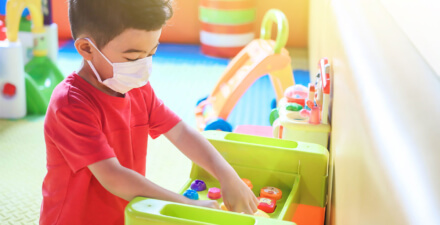New research shows the impact of 2020 job and income losses on family dynamics and parents’ mental health in vulnerable households

As job losses in the United States persist amid the coronavirus recession, the economic and mental health fallout becomes ever clearer. Historically, research on the effects of job losses and unemployment on parental mental health and family dynamics has emphasized its ill effects, highlighting, for example, the increase in parental stress and depression and disruptions in parent-child relationships in households suffering from job loss. Many of these adverse impacts can be traced to the financial hardships that can accompany sudden unemployment, particularly in economically vulnerable households.
During the pandemic, the expansion of the Unemployment Insurance system and other economic aid programs mitigated, at least temporarily, the most devastating consequences for those who are able to access those benefits. By the end of December, however, all of these expanded unemployment benefits will expire, while other fiscal measures to protect existing jobs from the ravages of the current third wave of the coronavirus pandemic and COVID 19, the disease caused by the virus, are stalled in the U.S. Congress.
What, then, has been the impact of job losses so far on family well-being during the pandemic? It turns out the answer is more nuanced than one might first assume. In our new working paper, I and my co-authors Susan Mayer and Rohen Shah at the University of Chicago find that there are, indeed, negative effects for mothers in low-income households, many of whom are experiencing increased levels of stress and depressive symptoms, compared to before the pandemic. Yet there also are positive effects for some mothers and their children. The difference is largely around whether mothers lose income due to pandemic circumstances.
These findings offer new insights into the effect that economic shocks, including the coronavirus pandemic, can have on the quantity and quality of time spent between mothers and children, as well as on the financial and emotional health of mothers. I’ll now walk through some of our specific findings.
Pandemic effects on family dynamics
Our survey research on the effects of the pandemic on family dynamics focuses on low-income families, where the virus has been more prevalent. These families, which often already face stresses associated with limited income, face additional pressures during the pandemic, including stress arising from stay-at-home orders and social distancing, separation from friends and other support resources, and disruptions to employment and daily routines. Children in low-income families tend, on average, to have lower academic and socio-emotional skills, compared to their peers in economically better-off households. The families in our study have preschool age children who are vulnerable to a slowdown, or even a reversal, in their skills development due to their preschools having closed in the spring.
On the one hand, given the stresses and pressures placed on low-income families during the pandemic, one would assume that mothers are facing more ill-effects than otherwise and that such negative effects are affecting relationships with their children. This conforms with much of the news coverage and other cultural assumptions prevalent during the pandemic.
On the other hand, many of those mothers received federal stimulus funds in late spring 2020 and, if they lost their jobs, received expanded Unemployment Insurance that, in some cases, amounted to a higher income during their unemployment. Some also may have partners who increased their work hours, and hence their income, due to the pandemic. In effect, these families experienced a type of paid family leave for at least one partner, albeit with an uncertain future looming directly ahead.
We also investigated the effects on parental mental health and stress, parent-child interactions, and children’s behavioral adjustment. We did this by comparing the relative importance of pandemic-induced economic hardships, such as job and household income losses and the inability to make ends meet, as well as pandemic-induced social conditions, including oneself or one’s family members becoming ill with COVID 19, and pandemic-induced increases in child care time.
The findings about the relative effects of job and income losses are especially relevant to discussions of economic support for low-income families. In particular, mothers who both lost their jobs and suffered substantial drops in household income were significantly more likely to report depressive symptoms, as well as increases in life stress, compared to those survey respondents who experienced neither of these events. These mothers also experienced less hope for the future. Importantly, however, losing a job with no substantial loss of household income had no impact on these mental health indicators.
Furthermore, parents who lost their jobs but did not experience a drop in their incomes reported having more positive interactions with their children and were more likely to report that their children enjoyed spending time with them. Parents struggling with losses of income, by contrast, report more often losing their temper and yelling at their children.
Conclusion
The coronavirus pandemic induced a severe economic recession that negatively affected millions of U.S. households. Much of this effect is captured in employment and income data, but for most of those families, the effects extend beyond jobs and income to include the emotional well-being of parents and their children. This is especially true as families experience shelter-in-place orders and children attend school from home.
In our new research, I and my co-authors show that the important factor in determining parents’ well-being is loss of income and not necessarily their employment status. For policymakers and others concerned about the well-being of U.S. households, a key lesson is to consider the extent of income losses, which shape parents’ mental health, how they relate with their children and, ultimately, children’s adjustment in a way that job losses by themselves do not. These results also highlight the importance of time for parenting. It is important for parents to have both income and time to spend with their children. If parents can have more time with no loss of income, then parent-child interactions can improve. This may suggest generous paid family leave is a promising way to improve child outcomes.
Unfortunately, these critical unemployment programs are set to expire at the end of the year, potentially leaving millions of Americans vulnerable to economic and material hardships. Leaders of both major parties have expressed support for renewing the programs in some form, but Congress has been unable to reach a deal to do so. Our findings underscore the urgency of these efforts.






